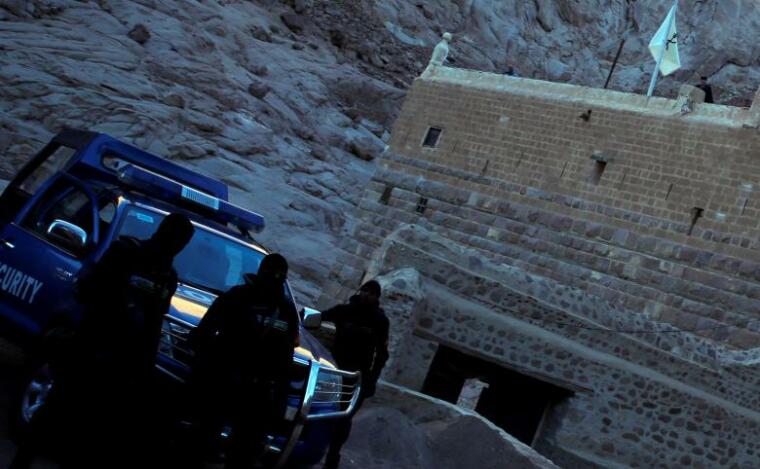ISIS claims responsibility for attack on police checkpoint near Sinai monastery

The Islamic State has taken credit for the attack that killed one policeman and wounded four others at an Egyptian police checkpoint near the Saint Catherine's Monastery in Sinai on Tuesday.
Tuesday's attack occurred at a checkpoint about 875 yards from the entrance to the monastery, which is considered as one of the world's most important Christian sites.
The monastery is located in a remote desert and mountainous area in the southern part of the Sinai Peninsula.
The militants opened fire from an elevated hilltop overlooking the checkpoint, Egypt's Interior Ministry said in a statement.
According to SITE Intelligence Group, which keeps track of the online activity of militants, announced the attack through the ISIS-affiliated Amaq news agency. This marks the first time ISIS carried out an attack on a monastery, according to The Associated Press.
The monastery, which was built in the sixth century, is a popular site for tourists who are visiting the Red Sea resorts along Sinai's southern coast.
Security has been put on high alert at tourist facilities across southern Sinai following the incident, Reuters reported.
The attack came just after the Palm Sunday bombings that were carried out by suicide bombers on two churches in the Nile Delta city of Tanta and the coastal city of Alexandria. ISIS also claimed responsibility for the twin bombings that killed 45 people.
The terror group has warned that there will be more attacks against Egypt's Christians, who make up about 10 percent of the country's population of over 90 million people.
Following the twin bombings, the Egyptian government declared a three-month state of emergency and deployed armed forces to help police in guarding vital installations, including churches.
Despite the state of emergency, militants were still able to carry out near-daily attacks against police and security forces in northern Sinai. The terror group had recently stepped up its attacks, moving its activities from Sinai to other parts of Egypt.
Many Christian families and students fled from North Sinai in February due to a spate of targeted killings.
Earlier this month, Israel barred its citizens from traveling to the Sinai Peninsula, saying the threat of attacks in the area inspired by ISIS and other jihadi groups was high.
 Christians don't have to affirm transgenderism, but they can’t express that view at work: tribunal
Christians don't have to affirm transgenderism, but they can’t express that view at work: tribunal Archaeology discovery: Medieval Christian prayer beads found on Holy Island
Archaeology discovery: Medieval Christian prayer beads found on Holy Island Presbyterian Church in America votes to leave National Association of Evangelicals
Presbyterian Church in America votes to leave National Association of Evangelicals Over 50 killed in 'vile and satanic' attack at Nigerian church on Pentecost Sunday
Over 50 killed in 'vile and satanic' attack at Nigerian church on Pentecost Sunday Ukrainian Orthodox Church severs ties with Moscow over Patriarch Kirill's support for Putin's war
Ukrainian Orthodox Church severs ties with Moscow over Patriarch Kirill's support for Putin's war Islamic State kills 20 Nigerian Christians as revenge for US airstrike
Islamic State kills 20 Nigerian Christians as revenge for US airstrike Man who served 33 years in prison for murder leads inmates to Christ
Man who served 33 years in prison for murder leads inmates to Christ


 Nigerian student beaten to death, body burned over ‘blasphemous’ WhatsApp message
Nigerian student beaten to death, body burned over ‘blasphemous’ WhatsApp message 'A new low': World reacts after Hong Kong arrests 90-year-old Cardinal Joseph Zen
'A new low': World reacts after Hong Kong arrests 90-year-old Cardinal Joseph Zen Iran sentences Christian man to 10 years in prison for hosting house church worship gathering
Iran sentences Christian man to 10 years in prison for hosting house church worship gathering French Guyana: Pastor shot dead, church set on fire after meeting delegation of Evangelicals
French Guyana: Pastor shot dead, church set on fire after meeting delegation of Evangelicals ‘Talking Jesus’ report finds only 6% of UK adults identify as practicing Christians
‘Talking Jesus’ report finds only 6% of UK adults identify as practicing Christians Mission Eurasia ministry center blown up in Ukraine, hundreds of Bibles destroyed: 'God will provide'
Mission Eurasia ministry center blown up in Ukraine, hundreds of Bibles destroyed: 'God will provide' Church holds service for first time after ISIS desecrated it 8 years ago
Church holds service for first time after ISIS desecrated it 8 years ago Burger King apologizes for 'offensive campaign' using Jesus' words at the Last Supper
Burger King apologizes for 'offensive campaign' using Jesus' words at the Last Supper Uganda: Muslims abduct teacher, burn him inside mosque for praying in Christ’s name
Uganda: Muslims abduct teacher, burn him inside mosque for praying in Christ’s name